
Probiotics and Antimicrobial Proteins
Scope & Guideline
Advancing the Science of Microbial Health
Introduction
Aims and Scopes
- Probiotic Mechanisms and Applications:
Research on how probiotics function at the molecular level, including their interactions with host cells, modulation of gut microbiota, and effects on immune responses. - Antimicrobial Peptides and Bacteriocins:
Investigation of naturally occurring antimicrobial proteins produced by various microorganisms, their mechanisms of action, and potential therapeutic applications against resistant pathogens. - Clinical and Preclinical Trials:
Conducting and reporting on randomized controlled trials and preclinical studies that evaluate the efficacy and safety of probiotics and antimicrobial peptides in various health conditions. - Microbiome Studies:
Exploration of the gut microbiome's role in health and disease, particularly how probiotics can restore balance and function in dysbiotic microbiomes. - Food Safety and Preservation:
Applications of probiotics and antimicrobial proteins in food preservation, safety, and improving functional food attributes. - Innovative Delivery Systems:
Research into novel delivery methods for probiotics and postbiotics, including microencapsulation and nanotechnology, to enhance stability and bioavailability.
Trending and Emerging
- Mental Health and Probiotics:
Recent studies are increasingly exploring the gut-brain axis, highlighting the role of probiotics in managing stress, anxiety, and other mental health conditions, which is an area of growing interest in both clinical and nutritional research. - Probiotics in Cancer Therapy:
Emerging research focuses on the potential of probiotics and postbiotics as adjunct therapies in cancer treatment, particularly regarding their role in modulating immune responses and enhancing the efficacy of conventional therapies. - Microbiome Engineering:
There is a trend towards engineering the microbiome using probiotics and prebiotics to prevent or treat diseases, reflecting a shift towards personalized medicine and targeted therapeutic strategies. - Environmental Applications of Probiotics:
Research into the use of probiotics in environmental contexts, such as bioremediation of contaminated sites and improving animal health in aquaculture, is gaining traction. - Postbiotics and Their Therapeutic Potential:
The exploration of postbiotics—metabolites produced by probiotics and their potential health benefits—has become a significant area of interest, indicating a shift towards understanding the broader implications of probiotic consumption.
Declining or Waning
- Traditional Probiotics in Fermented Foods:
There is a noticeable reduction in studies focused exclusively on the characterization of traditional probiotic strains isolated from fermented foods, as more emphasis is placed on novel strains and their clinical applications. - Single Strain Probiotics:
Research on the efficacy of single strain probiotics is declining in favor of multi-strain and synbiotic approaches, which are seen as more effective for achieving health benefits. - Basic Mechanistic Studies:
While foundational research remains important, there is a shift toward applied and translational research, resulting in fewer publications focused solely on basic mechanistic studies of probiotics. - Animal Models for Probiotic Testing:
Research using traditional animal models for testing probiotics is decreasing, with a growing preference for human clinical trials and in vitro studies that better mimic human biology.
Similar Journals
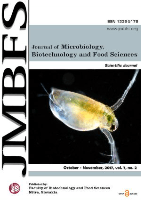
Journal of Microbiology Biotechnology and Food Sciences
Empowering scholars to tackle today's challenges in microbiology and food sciences.Journal of Microbiology Biotechnology and Food Sciences, published by SLOVAK UNIV AGRICULTURE NITRA, is a distinguished open-access journal dedicated to advancing scholarship in the interrelated fields of microbiology, biotechnology, and food sciences. With an ISSN of 1338-5178, this journal has been accessible to researchers worldwide since 2011, providing a platform for innovative studies that contribute to the understanding of microbial processes, biotechnological advancements, and food science applications. As reflected in its 2023 category quartiles, the journal holds notable positions in Biotechnology (Q3) and Food Science (Q3), and while it ranks in the lower quartiles for Microbiology (Q4) and Molecular Biology (Q4), it is committed to enhancing its impact within these domains. The journal encourages the submission of high-quality research articles, reviews, and short communications that address critical issues in these fields, making it an essential resource for academics, industry professionals, and students alike. Emphasizing both foundational research and practical applications, the Journal of Microbiology Biotechnology and Food Sciences stands as a vital contributor to the scientific discourse, fostering innovation and collaboration among researchers aiming to solve pressing challenges in food safety, biotechnology development, and microbial studies.
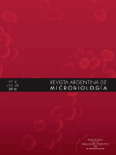
REVISTA ARGENTINA DE MICROBIOLOGIA
Pioneering accessible research in the heart of microbiology.REVISTA ARGENTINA DE MICROBIOLOGIA, published by the ASOCIACION ARGENTINA MICROBIOLOGIA, stands as a prominent open-access journal in the field of microbiology and medicine since its establishment in 1979. With an ISSN of 0325-7541 and an E-ISSN of 1851-7617, this journal has paved the way for disseminating high-quality research while enhancing accessibility for academics and practitioners worldwide. The journal has achieved notable rankings, being classified in Q3 for Medicine (miscellaneous) and Q3 for Medical Microbiology in 2023, reflecting its commitment to advancing knowledge in these critical areas. Despite its relatively modest impact factors, it occupies a vital niche in the academic landscape, fostering collaborations and innovative research among experts. With Open Access available since 2013, REVISTA ARGENTINA DE MICROBIOLOGIA not only facilitates widespread distribution of valuable scientific information but also empowers researchers, professionals, and students to stay abreast of the latest findings and developments in microbiology. For those engaged in the evolving realm of microbiology, this journal serves as an essential resource for sharing insights and advancing the scientific community.
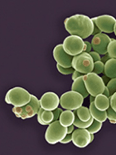
Annual Review of Food Science and Technology
Transforming Food Science Through Comprehensive ReviewsThe Annual Review of Food Science and Technology, published by ANNUAL REVIEWS, is an esteemed journal dedicated to advancing the knowledge within the field of food science. With an impressive Q1 ranking in the Food Science category, and ranking as #6 out of 389 in the Scopus Agricultural and Biological Sciences category, the journal serves as a vital resource for researchers, professionals, and students. This publication encapsulates comprehensive reviews and cutting-edge research, helping to bridge the gap between research and practical application. Though it does not offer Open Access, it provides valuable insights into various aspects of food science from 2010 to 2024, ensuring that its readership stays at the forefront of emerging trends and innovations. The journal's focus on high-quality, peer-reviewed articles makes it a critical platform for scholars looking to deepen their understanding and contribute to this rapidly evolving field.

ARCHIVES OF MICROBIOLOGY
Empowering Researchers with Cutting-Edge MicrobiologyThe Archives of Microbiology, published by Springer, is a reputable journal in the field of microbiology, serving as a vital platform for the dissemination of groundbreaking research and critical reviews since its inception in 1974. With an ISSN of 0302-8933 and an E-ISSN of 1432-072X, this journal operates out of Germany and maintains a global reach, promoting high-quality scholarship across multiple disciplines, including biochemistry, genetics, and molecular biology, as evidenced by its Q2 ranking in Medicine (miscellaneous) and consistent Q3 placements in other categories in 2023. Although the journal does not offer open access options, its rigorous peer-review process ensures that published articles are of the highest standard, making it an essential resource for researchers, professionals, and students keen on advancing their understanding of microbial sciences. As the journal converges toward 2024, it remains committed to fostering innovative microbiological research and facilitating interdisciplinary dialogue within the scientific community.
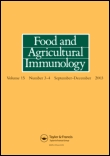
FOOD AND AGRICULTURAL IMMUNOLOGY
Pioneering Research for Resilient Food SystemsFOOD AND AGRICULTURAL IMMUNOLOGY, published by Taylor & Francis Ltd, is a distinguished journal dedicated to the intersection of immunology and agricultural sciences, providing valuable insights in areas such as food safety, plant health, and disease resistance since its inception in 1989. Operating as an Open Access journal since 2017, it offers researchers and professionals unrestricted access to groundbreaking studies and reviews that advance the understanding of immunological responses in agricultural contexts. With its current quartile rankings of Q2 in Agronomy and Crop Science and Q3 in Food Science, as well as Q4 in Immunology, the journal has established itself as a vital resource for those aiming to enhance the quality and safety of food production through innovative research. By leveraging its impressive Scopus rankings across various categories, the journal promotes interdisciplinary collaboration and knowledge dissemination pertinent to both scientists and policymakers engaged in the agricultural and food sectors.
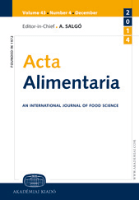
ACTA ALIMENTARIA
Elevating knowledge in food microbiology and safety.ACTA ALIMENTARIA is a renowned journal in the field of food science, published by AKADEMIAI KIADO ZRT, based in Hungary. Since its inception in 1973, it has served as a vital platform for disseminating high-quality research on food chemistry, microbiology, nutrition, and technology, contributing significantly to the advancement of knowledge in the agricultural and biological sciences. Currently classified in the Q3 quartile of the 2023 Food Science category, the journal is positioned to address pressing issues pertaining to food safety, quality, and sustainability, making it an invaluable resource for researchers, professionals, and students alike. Although it does not currently offer open access, the journal maintains a strong reputation with a readership keenly interested in the latest developments in food science. With a Scopus rank placing it in the 38th percentile of its category, ACTA ALIMENTARIA continues to be a pivotal reference for those engaged in food research and innovation.

Microbiology Research
Exploring the Microbial Universe, One Study at a TimeMicrobiology Research, published by MDPI, stands as a pivotal open-access journal in the field of microbiology, having established its presence since 2010. Based in Switzerland, this journal strives to provide a platform for innovative research and cutting-edge findings in various branches of microbiology, including medical microbiology and molecular biology. With an impact factor that reflects its dedication to scholarly excellence, Microbiology Research is classified in the Q3 category for both microbiology and medical microbiology, and Q4 for molecular biology as of 2023, indicating its growing importance and outreach within these domains. The journal aims to foster discussion and collaboration among researchers, professionals, and students by presenting articles that cover a wide array of topics and methodologies in microbiological research. Leveraging its open-access model, Microbiology Research ensures that high-quality research is accessible to a global audience, thus facilitating the advancement of knowledge and innovation in the microbial sciences.
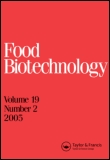
FOOD BIOTECHNOLOGY
Transforming Food Safety and Processing with ScienceFOOD BIOTECHNOLOGY is an essential journal for those engaged in the rapidly evolving fields of food science, biotechnology, and applied microbiology. Published by Taylor & Francis Inc., this journal has been a prominent platform since its inception in 1987, with a convergence of insights expected to continue until 2024. With an ISSN of 0890-5436 and an E-ISSN of 1532-4249, it holds significant academic weight, reflected in its 2023 rankings which place it in the Q3 category for both Applied Microbiology and Biotechnology and Biotechnology, alongside a stronger Q2 classification in Food Science. Although it currently does not operate as an open-access journal, its contributions to food biotechnology are invaluable for researchers, professionals, and students alike, providing a rigorous peer-reviewed outlet for innovative studies that advance the understanding of food processing, safety, and biotechnological applications. The journal’s relevance is further underscored by its Scopus rankings, which position it within the top tiers of its respective categories, making it a critical resource for the scientific community aiming to pioneer advancements in food biotechnology.

Food Frontiers
Elevating Food Science with Cutting-Edge ResearchFood Frontiers, an esteemed publication in the Food Science domain, is proudly published by WILEY. Launched as an Open Access journal in 2020, it aims to facilitate the dissemination of high-quality research that influences contemporary food science and technology. The journal, with an E-ISSN of 2643-8429, has rapidly ascended to a Category Quartile ranking of Q1 in the Food Science category as of 2023, and boasts an impressive Scopus rank of #31 out of 389 in Agricultural and Biological Sciences, placing it in the 92nd percentile. The journal's mission is to explore innovative approaches to food production, safety, and sustainability, making it an essential resource for researchers, industry professionals, and students eager to stay at the forefront of food science advancements. With a commitment to open accessibility, Food Frontiers fosters collaboration and knowledge sharing across the globe, addressing the critical challenges and trends in feeding the world sustainably.
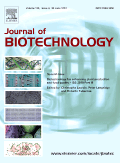
JOURNAL OF BIOTECHNOLOGY
Exploring the intersection of microbiology and innovation.JOURNAL OF BIOTECHNOLOGY, published by Elsevier, stands as a premier platform in the fields of Applied Microbiology, Biotechnology, Bioengineering, and Medicine. With an ISSN of 0168-1656 and an E-ISSN of 1873-4863, this journal has significantly contributed to the advancement of biotechnological research since its inception in 1984 and continues to be a vital resource until 2024. Notably ranked in the Q2 quartile across multiple categories, it excels with impressive Scopus rankings, placing within the top 20% in Applied Microbiology and Biotechnology. This underscores its impact on both the scientific community and the ongoing developments in biotechnological applications. The journal encourages submissions that promote innovative research and practical insights, fostering collaboration among researchers, professionals, and students alike. Although it does not currently offer Open Access options, the journal remains highly regarded for its rigorous peer-review process and commitment to excellence in biotechnological literature.